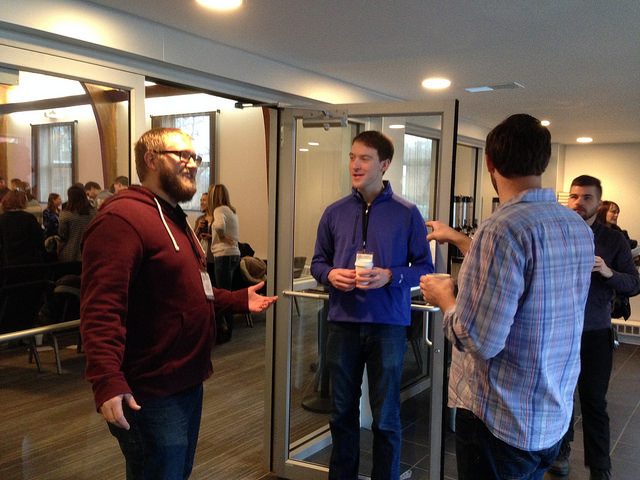By Tobin Perry
CINCINNATI, Ohio – Eric Tuffendsam (@eric_moonlight) had a problem. Though he believed God had called him to be a pastor, he knew he wasn’t ready. With a growing family, a new business and tight resources, the Cincinnati resident didn’t know where he’d find the additional hands-on training he needed.
But over the past six months, with the help of a 5-year-old church plant in Cincinnati and the support of the North American Mission Board, Tuffendsam has found practical pastoral training without moving his family or closing down his business.
“Ministry isn’t all flowers and birds chirping,” said Tuffendsam, who is a North American Mission Board (NAMB) church planting intern. “The way people see a life of ministry from the outside—even those who have gone to seminary—is very romanticized. I had never seen how real the job of ministry is until this residency, and I’ve been doing ministry for years within the local church. But being so connected with the pastors [at Christ the King Church in Cincinnati] and seeing what they go through, it’s a whole new ballgame.”

Eric Tuffendsam, a resident at Christ the King Church in Cincinnati, Ohio, welcomes people into a worship gathering at the church. Part of Tuffendsam’s residency program has been developing and leading the church’s assimilating plan, guiding new members into the life of the church. Photo courtesy Eric Tuffendsam
Christ the King, a multi-campus Southern Baptist church plant that started in downtown Cincinnati, is in the middle of its second year of a residency program at the church. The North American Mission Board provides funding for three of the eight residents in the program. One of them is a lead planter and the other two are church planting interns. Most of the current crop of residents came from within the church.
Through its Missionary Development Farm System, NAMB funds four levels of church planting engagement—student missionaries, interns, apprentices and church planters. The Farm System is expected to prepare future generations of church planters and help the entity reach its goal of partnering with local churches to start 15,000 Southern Baptist churches before 2022.
Michael Clary (@dmichaelclary), Christ the King’s pastor, describes the church’s residency program as a mix between the theological and the practical. Residents spend the first half of their year focused mostly on studying Scripture and books on theological and ministry development. Residents discuss what they are learning with one another in a group setting and with one of the church’s pastors. Each resident is assigned a pastor as a mentor.
The second half of the residency is devoted to providing opportunities for ministry development. Residents participate in ministry leadership at the church and receive input from their pastoral coach and the other interns along the way.
“If it were not for the NAMB internships, this would be much more difficult to get off the ground,” Clary said. “It has been a huge blessing.”
Tuffendsam says the residency has made a significant impact on his future ministry capacity.
“It’s like looking into a huge mirror of God’s glory and His Church that He has established and seeing this is exactly what I need to be prepared and until I get that I’m not ready,” Tuffendsam said. “Then they give you what you need to get there.”
As Tuffendsam has transitioned into the ministry development portion of the residency, he was given the responsibility of coordinating the church assimilation process—including everything from designing the process to leading volunteers in the effort. Along the way, his pastoral mentor and his residency peers get opportunities to speak into what he’s doing. As an intern he has also helped to lead a person to faith in Christ and has also been discipling a couple of college students.
Clary has spent much of the past year developing a discipleship plan that mirrors the residency program but seeks to disciple the church’s lay people. The church began piloting the program, called Element, beginning last fall. Just like the residency program, the discipleship plan included required readings and ministry development. The five-month plan (which will likely be stretched to eight months next time) centered on five core identities of a disciple—worshiper, family, learner, servant and missionary.
“The Great Commission says it’s our job to make disciples,” Clary said. “But I felt like we needed to define what it means to be a disciple. What does it mean for a new Christian to become a fully functioning disciple? That’s where the core identities language comes from. A disciple will worship Jesus from the heart, they’ll learn what it means to be a part of a church family, they will learn about the Bible and basic theology, they will learn to serve in the community and they will learn to share their faith with others.”
Clary and Christ the King have played an active role in Send North America efforts in Cincinnati. Send North America is NAMB’s effort to help local Southern Baptist churches plant new churches in 32 of the largest and most influential cities in North America.
Tobin Perry writes for the North American Mission Board.






